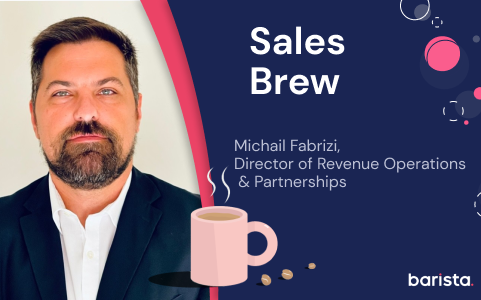Sales Brew - Benjamin Roach, Global Sales Operations Manager at Ardoq on CRM data hygiene

Roy Weinstock
For the 6th episode of Sales Brew by barista AI, we had the opportunity of hosting Benjamin Roach, a frontline veteran that turned to operations and never looked back. Today he is the Global Sales Operations Manager at Ardoq We’ve discussed how you could leverage communities in Ops, the advantage of having a sales background, and all about CRM data hygiene. You’ll enjoy this one.
To watch the full interview and get updated on every sales brew episode, subscribe to our YouTube channel. A short version and transcription are below. Get a cup of coffee and enjoy the show!
How did you get into Sales Operations?
I am a global Sales Operations Manager for Ardoq,, an enterprise architecture SaaS platform based in Norway. I have been working in Revenue Operations for the past five to six years. I started as a frontline sales leader, working my way up from a BDR to a sales director. However, I found myself more fascinated by the go-to-market strategy and the factors that influence a company’s sales process. This passion led me to delve deeper into data analysis and spend less time on actual selling, which is not ideal as a sales director. Therefore, I made the decision to switch to Rev Ops, and from there, I picked up the skills and knowledge required to excel in this field.
How important it is to start in sales?
That’s an excellent question. In my opinion, my experience as a sales leader has given me a significant advantage in RevOps. As a part of RevOps, one of our primary goals is to act as a liaison between different departments, such as sales, marketing, and product, to create a cohesive environment. Being a salesperson, I understand the language and the pressure that sales leaders and reps face daily. I believe this has helped me to bridge the gap between the different departments and have productive conversations. For instance, when rolling out a new metric to a sales rep, they may not care and prioritize selling more. As a RevOps professional, I can explain why the metric matters and how it can help them sell more. This perspective has helped me tremendously in my RevOps journey.
In terms of designing and implementing new processes, I try to put myself in the shoes of a sales rep and think about what would matter to me and what makes sense from their perspective. Although I’ve been out of the game for a while now and have not sold during COVID or other challenges, I believe this mindset helps in the initial process build. Additionally, when collaborating with internal champions, having this perspective helps build consensus towards a common goal.
You’re a member in a lot of RevOps communities. What is the value you get from them?
Yes, I believe that being involved with communities has been very impactful for me. It provides an opportunity to challenge myself, not only by asking questions but also by researching new processes and understanding what others have done before. It helps to build a sense of community, which is what you make of it. If you’re engaged and having conversations, it can be very beneficial. For me, these communities have been instrumental because there is so much to learn, and no one person knows it all. It’s essential to seek out challenges, learn from others, and understand if my processes make sense to other professionals in the industry.
I would highly recommend that individuals join communities and share knowledge with their peers. It’s crucial to acknowledge that no one person knows everything and that we’re all constantly learning. Someone else’s experience may be something that you’re currently going through, and they may be able to provide valuable insights and help you navigate the situation. Therefore, I strongly encourage joining communities and engaging in conversations to learn and grow.
What are the most urgent CRM challenges you’re always facing?
Yes, right now we are facing a challenge as we migrate from HubSpot to Salesforce. During this transition, we are conducting a data audit and have realized that a significant portion of our data is not clean. We have found that some of the data in our territories and books of business are incorrect, and we have companies in our system that don’t fit our ideal customer profile. This is problematic because we need to rely on this data to run reports and analyze our business. Therefore, ensuring that the data we input is of high quality and remains up to date is a critical challenge for us at the moment.
What is the #1 tip to govern CRM data?
I believe that the first step in addressing our CRM challenges is to figure out where the problem is coming from. It’s crucial to understand the process of how companies get added into our CRM and whether there is a logic and reason behind it. Currently, at Ardoq, we have some issues with our BDRs being able to add any company they want into the CRM, leading to a “Wild, Wild West” situation. To improve the quality of our data, we need to better understand why certain companies are being added. Are they fitting our Ideal Customer Profile (ICP)? Are they in line with our target market, or are they simply added to hit a number? These are some of the important questions that we need to ask ourselves. As we continue to grow as an organization, we’re starting conversations to address these issues, and we’re realizing that we don’t need every single account that ZoomInfo has to be within our CRM. It’s essential to understand where the data is coming from, what processes are in place, and how we can better gatekeep to ensure that we have high-quality and cleaner data.
Can you elaborate on data entry protocols you have at?
For example, one of the things we have done is set a process for adding accounts to the CRM. Reps are required to determine where the account fits within the ICP and what tier it belongs to. We have established that only tier one companies can be added without approval from the BDM manager. This ensures we prioritize quality and avoid importing accounts just for the sake of it. These are some of the initiatives we are implementing to better orchestrate CRM data.
What are the main trends you see in RevOps?
Yeah, that’s a great question. I think the current trend that everyone is seeing is the value of Rev Ops. The concerning trend is that many people don’t fully comprehend how Rev Ops fits into their organization at a given time because Rev Ops grows and evolves alongside the organization. Therefore, simply establishing a Rev Ops team and stating that they will take ownership of everything may set that team up for failure if there has never been a Rev Ops team before. Thus, we are beginning to observe some of these trends and where they will be in five years. I believe that we will have a significant role in terms of understanding business processes and go-to-market strategies. Your CRO will probably depend
on a VP of Rev Ops. I think that strategically, we will see this role becoming more and more prevalent. As Rev Ops believers, we can only hope to see this trend continue.
How do you like your coffee?
Black, straight, black Americano. You just got to get the good coffee.
To watch more from Sales Brew about sales operations and more:
- Episode 1: Sales Brew with Tyler Meckes, Account manager at Dooly
- Episode 2: Morgan J Ingram, Director of Sales Execution and Evolution at JB Sales
- Episode 3: James Buckley, Chief Evangelist and Master of Ceremonies at JB Sales
- Episode 4: Nieka Mamczak, Head of Sales Enablement at StackOverflow
- Episode 5: Sam Sweeny, Sales Operations Manager
- Episode 6: Benjamin Roach, Global Sales Operations Manager at Ardoq
- Episode 7: Elgun Aliyev, Salesforce Admin at CentralReach
- Episode 8: Amanda Harwood, Sales Operations Manager
- Episode 9: Jake Rasmussen, Salesforce Consultant


